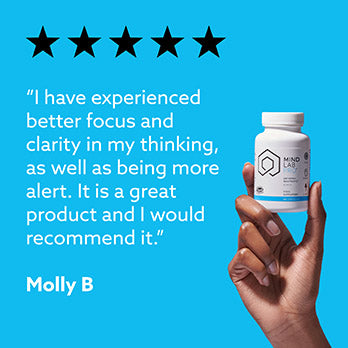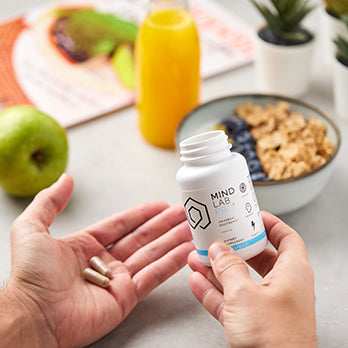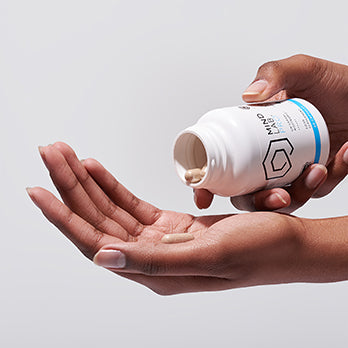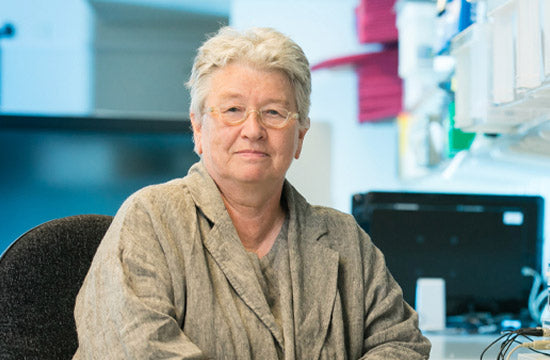Rhodiola rosea is one of the most time-tested natural performance enhancers that you can take. But how long should you expect to take Rhodiola before you feel its effects? We're exploring how long it takes Rhodiola to work in this guide. Let's get to it!
Key Takeaways
- Rhodiola rosea is an adaptogen herb known for its ability to enhance mental and physical performance, in part by blunting the negative effects of stress.
- Rhodiola has nootropic effects for mental energy, mood, clarity and more. It may also enhance exercise performance, physical stamina, muscle development and work capacity.
- Single-dose Rhodiola rosea supplementation: Researchers have suggested that Rhodiola rosea's stimulating effects can begin within 30 minutes and last 4-6 hours.
- Taking it over time can confer more benefits, with researchers suggesting it may take anywhere from a few days to 4-6 weeks to raise energy and cognition.
- Always be sure to consult with your doctor before incorporating dietary supplements, including Rhodiola rosea, into your wellness regimen.
Best supplement with Rhodiola rosea Mind Lab Pro® (MLP®): A full-spectrum nootropic stack designed to optimize the whole brain, MLP® supplies 11 nootropic ingredients including 50 mg of Rhodiola rosea extract standardized to 3% rosavins and 1% salidroside. Learn More about MLP®
What is Rhodiola Rosea?

Rhodiola, also known as rosenroot, arctic root, or golden root extract, has been used for centuries as a traditional herbalism in eastern cultures.
This adaptogen is best known to strengthen mental and physical stress tolerance. As it helps promote resilience and stress resistance, Rhodiola (and other adaptogens) are believed to normalize physiological functions and unlock peak performance.
You often find rhodiola as part of some of the best nootropic stacks, such as Mind Lab Pro, due to its effects on brain support and protection, and its benefits on fighting mental fatigue, promoting sharp cognition, combating burnout symptoms, and supporting a calm state of mind.
Rhodiola Benefits
Before we get into timing, let's take a look at the various benefits associated with Rhodiola rosea supplementation. Rhodiola rosea may help to:
- Alleviate stress-related fatigue and burnout; promotes natural energy
- Enhance cognitive function and overall performance under stress
- Potentially reduce symptoms of mild to moderate depression
- Assist with recovery from mental and physical exhaustion
- Enhance mood stability and emotional resilience
- Support nootropic benefits like learning, focus and attention
- Promote neuroprotective effects (via antioxidant properties) for long-range brain health
Learn more about Rhodiola rosea uses and potential benefits
Rhodiola Rosea: How Long Does it Take to Work?
Fast-acting effects: Adaptogen herbs like Rhodiola can start working shortly after taking them, reinforcing their use in traditional herbalism as fast-acting performance enhancers. Acting on part of the body’s stress response system, the sympatho-adrenal-system (SAS), rhodiola provides a rapid response to a stressor, sustaining neurotransmitters including serotonin, dopamine, and norepinephrine.
- In one study focusing on single-dose adaptogen effects, researchers reported that Rhodiola rosea was the most effective (versus adaptogens Schizandra chinensis and Eleutherococcus senticosus), producing a stimulating effect that starts within 30 minutes and lasts for at least four to six hours.(1)
Longer-range effects: The effects of chronic Rhodiola rosea supplementation can also begin to appear relatively quickly, with many clinical studies reporting noticeable benefits within the first week, and greater improvements after 2 to 6 weeks of consistent use.
- In one study, researchers reported that study subjects demonstrated a significant improvement in the fatigue index after two weeks of R. rosea supplementation.(2)
- A systematic review reports that Rhodiola can enhance mental performance and reduce fatigue, with these effects noticeable within a few days but stabilizing over a few weeks of use.(3)
- Another review suggested that the most significant reductions in stress-related fatigue are achieved in about 2-4 weeks when supplementing with Rhodiola rosea extract.(4)
Overall, Rhodiola is capable of producing effects right away from a single dose. As part of an ongoing supplement regimen, some people may feel benefits within a week, but consistent use for 4–6 weeks is typically needed to feel Rhodiola's full potential -- especially when it comes to benefits for mood, anxiety, and cognitive performance.
What Does Rhodiola Do?

Rhodiola as an adaptogen
Rhodiola Rosea Roots are best known for their adaptogenic properties.
Adaptogens are substances, usually herbal, that help our body cope better with the physical effects of stress. While there are many ways to cope with life stress symptoms and certain stress-induced conditions, adaptogens have been used for centuries as an effective coping remedy.
What are the Benefits of Rhodiola Rosea Dietary Supplements?
These herbs aid our bodies in reacting to, or recovering from, short- and long-term physical and mental stress. There is even some research to suggest that these herbs can also boost immunity and promote overall good health, treat stress induced fatigue symptoms, enhance cognition, ease feelings of generalized anxiety disorder and depression, and help us thrive in our time of need.
How these herbs do this is by helping us stay longer in the “resistance” phase of our stress response, thus helping us persevere through stressful situations before the mental crash sets in.
Additionally, these herbs can also regulate cortisol levels, which is the hormone released in response to stress. While this stress hormone is good in small doses, too much of it can wreak havoc on our body, further warranting the need to keep it under control.
Rhodiola Supplementation for boosting mood
Rhodiola is also thought to help boost and stabilize mood, thus helping to support a more balanced mindset. Additionally, it is thought to help ease symptoms of anxiety and depression (often a low mood), which would help overall improvements in mood.
Rhodiola Supplementation for physical and mental performance
Some clinical evidence research has indicated that rhodiola rosea supplementation may improve physical performance and cognitive function by reducing chronic fatigue symptoms and enhancing alertness, attention, and concentration.
This can also apply to anaerobic exercise performance, as rhodiola can reduce lactate concentration levels, and reduce skeletal muscle damage due to prolonged exertion, which is why you may find rhodiola in various performance aids. It is suitable as a natural pre-workout supplement.
Rhodiola Rosea Supplementation: Optimal Dosage
Supplementation of rhodiola tends to refer to the SHR-5 extract, or an equivalent extract, that confers both 3% rosavins and 1% salidroside, which are the active compounds found in rhodiola responsible for many of the proposed health benefits.
There have been reports of rhodiola being effective when supplemented daily as a preventative against prolonged fatigue, with doses as low as 50mg. However, acute usage of rhodiola for fatigue and anti-stress is thought to be effective in doses in between 288-680mg.
Rhodiola is thought to be an herb that has a bell-curve response, which means that there is a dosage sweet spot. It’s also recommended to not exceed the recommended 680mg per day as higher doses are thought to be ineffective.
The Best Way to Take Rhodiola Rosea
While it has been shown that rhodiola is an effective standalone supplement, it would unsurprisingly be more beneficial to take as part of a nootropic stack or formula, such as Mind Lab Pro.
Rhodiola rosea is an herbal nootropic adaptogen that may strengthen mental and physical stress resistance – helping to promote mental energy and clear, calm thinking under challenging conditions.
Did you know? There's more than one rhodiola species. Rhodiola rosea and Rhodiola crenulata are most popularly found in supplements, but Rhodiola rosea is preferred because it supplies both of the most prized active consitutents, rosavins and salidroside.
Best Nootropic Supplement with Rhodiola Rosea Extract Powder: Mind Lab Pro®

Mind Lab Pro® supplies: Rhodiola Rosea Extract Root Powder 50 mg standardized to 3% rosavins and 1% salidrosides.
The Full MLP Formula: Citicoline (CDP Choline) dosage 250mg per serving, Phosphatidylserine (PS) 100mg (from sunflower lecithin), Bacopa monnieri 150mg (24% bacosides, 9 bioactives), Organic Lion's Mane Mushroom 500mg (fruit and mycelium), Maritime Pine Bark Extract 75mg (Standardized to 95% proanthocyanidins), N-Acetyl L-Tyrosine 175mg, L-Theanine 100mg per serving, Rhodiola rosea 50mg (Standardized to 3% rosavins and 1% salidrosides), NutriGenesis® Vitamin B6 (2.5 mg), Vitamin B9 (100 mcg), Vitamin B12 (7.5 mcg)
Mind Lab Pro is a potent universal nootropic formula that combines 11 cognitive-enhancing ingredients, including rhodiola rosea standardized extract. All of these ingredients work synergistically to provide you with the most powerful mental and physical performance benefits.
Collectively, the ingredients in Mind Lab Pro work to:
- Increase mental energy and physical endurance without the stimulants
- Improve mental focus and concentration
- Support stress reduction
- Boost athletic performance; both resistance and endurance exercise performance
- Enhance memory, learning and recall
- Promote a healthy and balanced mood
Rhodiola extract would also work well with other adaptogenic herbs such as ashwagandha, which is also a stress-reliever, and a natural testosterone booster.
Read more about “Rhodiola and Ashwagandha Together: Benefits and How to Take” in our linked guide!Summary: How Long Does It Take Rhodiola Rosea to Work?
If you are wondering how long does rhodiola rosea take to work in the short term, upon consumption of rhodiola, it is thought to take effect with 30 minutes with the immediate effects lasting 4-6 hours.
For the best results and greatest range of benefits, however, it is advisable to take Rhodiola rosea for 4-6 weeks and gauge your results.
While rhodiola rosea can reduce stress, some of the other proposed benefits include relieving anxiety, stabilizing mood, and improving mental and physical performance, especially in cognitively demanding situations. It has been studied for helping depression as well, including major depressive disorder.
The best way to take rhodiola is either alongside other nootropic ingredients, such as Mind Lab Pro, or paired with other adaptogenic herbs such as ashwagandha.
References
- Panossian A, Wagner H. Stimulating effect of adaptogens: an overview with particular reference to their efficacy following single dose administration. Phytother Res. 2005 Oct;19(10):819-38. doi: 10.1002/ptr.1751. PMID: 16261511.
- Darbinyan V, Kteyan A, Panossian A, et al. Rhodiola rosea in stress induced fatigue – a double blind cross-over study of a standardized extract SHR-5 with a repeated low-dose regimen on the mental performance of healthy physicians during night duty. Phytomedicine 2000;7:365-371.
- Ishaque S, Shamseer L, Bukutu C, Vohra S. Rhodiola rosea for physical and mental fatigue: a systematic review. BMC Complement Altern Med. 2012 May 29;12:70.
- Ross SM. Rhodiola rosea (SHR-5), Part I: a proprietary root extract of Rhodiola rosea is found to be effective in the treatment of stress-related fatigue. Holist Nurs Pract. 2014 Mar-Apr;28(2):149-54.




































